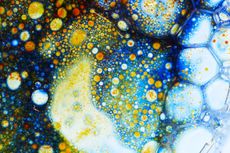Health & Science
The stuff of life on Mercury; A tap water danger?; A rift over the Grand Canyon; Africa’s disappearing lions
The stuff of life on Mercury
Mercury, the closest planet to the sun, has blistering 800-degree temperatures at its equator—but its poles are full of ice. New data from NASA’s Messenger spacecraft, which began orbiting Mercury last year, has revealed that as much as a trillion tons of ice exists in shadowy polar craters, where temperatures can drop to minus 370 degrees. Much of the ice appears to be covered in carbon-based organic compounds—some of the “same ingredients that may have led to life on Earth,” UCLA planetary scientist David Paige tells Reuters.com. Millions of years ago, icy asteroids and comets collided with Mercury, seeding the planet with ice and organic compounds—the same process, scientists believe, that made Earth a watery planet. Mercury’s environment has long been considered too hostile for life, but the new observations have raised the question of whether any regions on or within Mercury might have both liquid water and organic compounds. Somewhere between the poles and the equator, Mercury might have milder regions that are more hospitable, especially just below its surface. Researcher Maria T. Zuber, of the Massachusetts Institute of Technology, said it’s not likely that life exists on Mercury, but the fact that even such an inhospitable planet contains both water and organics “raises the possibility that life could occur someplace else.’’
A tap water danger?
Subscribe to The Week
Escape your echo chamber. Get the facts behind the news, plus analysis from multiple perspectives.

Sign up for The Week's Free Newsletters
From our morning news briefing to a weekly Good News Newsletter, get the best of The Week delivered directly to your inbox.
From our morning news briefing to a weekly Good News Newsletter, get the best of The Week delivered directly to your inbox.
Chemicals used to purify tap water may be causing food-allergy rates to skyrocket in the U.S., a new study suggests. Researchers at the Albert Einstein College of Medicine tested the urine of more than 2,000 people for dichlorophenols, chemicals found in chlorine-treated tap water and in pesticides used on many fruits and vegetables. They found that people with the highest levels of dichlorophenols in their bodies were 80 percent more likely to have food allergies—most commonly to eggs, milk, peanuts, wheat, soy, and shellfish—than those with the lowest levels. Over the past 15 years, food-allergy rates have increased nearly 20 percent in the U.S.; more than 3 million children younger than 18 have allergies with reactions that range from mild to deadly. “While the study does not allow concluding that pesticides are responsible for the allergies, it certainly raises the possibility,” Kenneth Spaeth, an expert on environmental pollutants at North Shore University Hospital on Long Island, N.Y., tells ABCNews.com. Researchers think that Americans’ increased exposure to dichlorophenols may be killing off healthy bacteria in the gut that help the immune system function properly, causing it to attack otherwise harmless proteins in food.
A rift over the Grand Canyon
Have geologists been all wrong about how the Grand Canyon was created, and when? That’s the implication of a new study that estimates the canyon’s age at 70 million years, instead of 6 million, The New York Times reports. Researchers from the University of Colorado used advanced dating techniques to calculate the age of a mineral called apatite found in rocks in the canyon. Their measurements suggest that it wasn’t the west-flowing Colorado River that carved the canyon, but “an ancient Cretaceous river that flowed eastward from western highlands.” That would mean that the last of the dinosaurs, which became extinct around 65 million years ago, might have gazed into the now 277-mile-long chasm. If they did, they would have seen not “the starkly beautiful desert of today but an environment with more lush vegetation,” says University of Maryland paleontologist Thomas Holtz. But other experts who have studied canyon sediments insist that the Colorado eroded the gorge far more recently. University of New Mexico geologist Karl E. Karlstrom calls the idea that the Grand Canyon existed during the dinosaur age “ludicrous.”
Africa’s disappearing lions
Sign up for Today's Best Articles in your inbox
A free daily email with the biggest news stories of the day – and the best features from TheWeek.com
Africa’s lions are dwindling toward extinction at an alarming rate, Duke University researchers say. Using new high-resolution satellite data from Google Earth, they’ve discovered that the savanna habitat that lions need to survive has shrunk by 75 percent over the past 50 years and is far more fragmented than conservationists previously realized. Over the same period, the lion population is thought to have declined by two thirds, from 100,000 animals to fewer than 35,000. “Those in West Africa are in particularly bad shape,” study author Stuart Pimm tells NBCNews.com; fewer than 500 lions remain there, where the human population has doubled in the last three decades. Only about 24,000 African lions live in areas where they have space to roam and are safe from hunters—including farmers who often kill them to protect their livestock. Elsewhere, the species is at risk of disappearing. The “stunning and grim” discovery that Africa’s savannas—and lions—are nearly gone, says Thomas Lovejoy, a conservationist at George Mason University, “emphasizes the urgency for conservation of these great habitats.”
Create an account with the same email registered to your subscription to unlock access.
-
 'Make legal immigration a more plausible option'
'Make legal immigration a more plausible option'Instant Opinion Opinion, comment and editorials of the day
By Harold Maass, The Week US Published
-
 LA-to-Las Vegas high-speed rail line breaks ground
LA-to-Las Vegas high-speed rail line breaks groundSpeed Read The railway will be ready as soon as 2028
By Peter Weber, The Week US Published
-
 Israel's military intelligence chief resigns
Israel's military intelligence chief resignsSpeed Read Maj. Gen. Aharon Haliva is the first leader to quit for failing to prevent the Hamas attack in October
By Justin Klawans, The Week US Published
-
 Why the Y chromosome is vanishing and what this means for the future
Why the Y chromosome is vanishing and what this means for the futureThe Explainer A new sex gene could be on the evolution pipeline
By Devika Rao, The Week US Published
-
 14 recent scientific breakthroughs
14 recent scientific breakthroughsIn Depth From photos of the infant universe to an energy advancement that could save the planet
By Devika Rao, The Week US Published
-
 Antimatter isn't immune to gravity, landmark experiment confirms
Antimatter isn't immune to gravity, landmark experiment confirmsSpeed Read Antimatter is the mysterious evil twin of matter, but new research proves they do have something fundamental in common
By Peter Weber Published
-
 'Inverse vaccine' shows promise treating MS, other autoimmune diseases
'Inverse vaccine' shows promise treating MS, other autoimmune diseasesNew research effectively cured mice of multiple sclerosis–type symptoms. Could this work in humans?
By Peter Weber Published
-
 Air pollution is now the 'greatest external threat' to life expectancy
Air pollution is now the 'greatest external threat' to life expectancySpeed Read Climate change is worsening air quality globally, and there could be deadly consequences
By Devika Rao Published
-
 How Antarctica has become the enduring climate change bellwether
How Antarctica has become the enduring climate change bellwetherThe Explainer Despite its remote location, the southernmost continent is stricken with climate change issues
By Justin Klawans Published
-
 NASA fully restores contact with Voyager 2 spacecraft
NASA fully restores contact with Voyager 2 spacecraftSpeed Read
By Justin Klawans Published
-
 'Extremely dangerous heat wave' to scorch parts of US
'Extremely dangerous heat wave' to scorch parts of USSpeed Read
By Justin Klawans Published